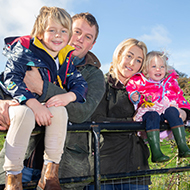
Findings will define future support for farming people.
The Royal Agricultural Benevolent Institution (RABI) has concluded the first stage of its Big Farming Survey, the largest ever research project into the health and wellbeing of people in the farming sector throughout England and Wales.
The survey achieved an incredible response rate, totalling around 15,500 responses. According to RABI, this has provided 'the most comprehensive level and range of data ever collected.'
Alicia Chivers, CEO of RABI, said: “To ensure we gathered responses from the widest possible range of farming people, we had to be ambitious on behalf of our community.
“The results have exceeded our expectations and astounded many... We are hugely grateful to every organisation and individual who has supported the Big Farming Survey.
“Our objective was to deliver statistically valid findings that encompass the diversity in farming today. We have more than achieved this. The results will provide a true reflection of the pressures and the impacts that people are facing, both from a personal and business perspective.”
The Centre for Rural Policy Research at the University of Exeter will now begin to analyse the responses, with the findings to be published at a live launch event in the autumn.
Ms Chivers added: “During this next stage of data analysis, we will be working closely with other sector stakeholders to consider how to apply the findings to develop a targeted and thorough approach to the provision of future services for farming people.
“We’d like to say a huge thank you to everyone who has completed, shared and supported the Big Farming Survey. Through our combined efforts, we can develop the best possible tools to enhance farmer and business resilience now and for years to come.”



 The latest
The latest